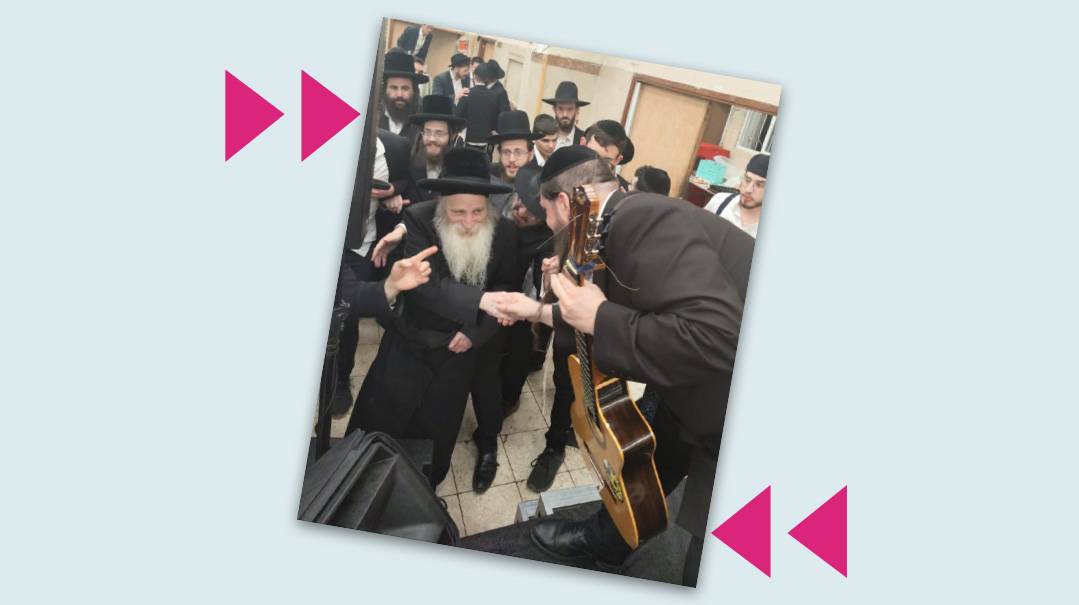The Songs I Wrote
| July 16, 2024“Although other artists expressed my songs differently, here I’ve decided to take them back in my own style”

Just Out
After years of composing and arranging music for a who’s who of topflight Jewish music artists, ELI KLEIN recently decided to break new ground by putting out a full album of his own compositions. Eli is half of the gifted Yitzy Berry and Eli Klein team whose studio in Jerusalem is a creative hub, offering full services from songwriting to arranging, producing to mixing and mastering, and anything in between. Their clients include MBD, Ohad, Naftali Kempeh, Rabbi Shloime Taussig, Benny Friedman, Eli Marcus, and dozens of others.
“When I record demos of my new compositions to offer to singers, their response is often to ask me why I don’t just sing and release them myself. Eventually, I began to think, why not?” Eli says.
Klein’s album, SHIRIM SHEKATAVTI, a collection of some of his best compositions, is also a platform for his own singing debut. Joining him is a choir of bochurim to give the entire album a kumzitz feel — he describes his singing as “kumzitz style,” which means that for some tracks he’s altered the entire arrangement and tempo from their original version.
“This is how I like to sing,” Eli says. “So although other artists expressed my songs differently, here I’ve decided to take them back in my own style. For example, when Motti Steinmetz took my ‘Zechor Bris Avraham,’ it was clear that he would record it in his chassidishe havarah and style. I was so used to this sound that it actually took me time to remember the way I originally composed it 14 years ago. I had to sing it a few times before I got used to it again and made it mine.”
The song “Tze’akah” was recorded by Mordechai ben David with an electronic arrangement, but Eli decided to rewrite the musical arrangement, using live instruments for a softer, more singable feel.
“I imagined being with a crowd and singing the song along with them,” Eli says. “Although I wrote the original arrangement, and maybe MBD wouldn’t even have taken the song in this new style, I saw this album as a chance to slow things down. When I wrote the song, I first put on a beat and then composed the song, so the tune was born into an electronic beat. But had I composed it with only a piano, the creation might have been different.”
Meir Gafni’s 2015 release “Ha’avos Hakedoshim” has been rerecorded here with a slightly faster tempo. At the time, there was a debate among several arrangers as to the proper tempo, and a softer version was decided upon. “I actually thought the original was a little slow, and when I recorded it here, I chose a faster tempo. I think it’s improved the flow of the song, although it’s still up for discussion.”
The collection includes world-class hits like Ohad’s “Birchas Habonim,” which Eli wrote at Ohad’s request, when the singer was looking for a song to express his feelings at his son’s bar mitzvah. There are also a few lesser-known pieces, and even two new songs. One of them, “Mah Ashiv,” was sent around to a few singers, but after one of them had already selected it, Eli decided it was taken — he’d keep it for his own album.
“It’s really singable, a piece that the chazzan and kahal can sing together in shul,” he says about his new composition. But if he has to pick a favorite, it might be “Basi Legani,” which he composed together with Yonatan Shainfeld in honor of Yonatan’s marriage. “I love it. It’s about the connection between Knesses Yisrael and HaKadosh Baruch Hu, and you feel the longing and the search for Hashem in the melody.”
Longtime chavrusa and music partner Yitzy Berry joins Eli in the new version of “Bizchus HaTorah,” which they wrote together for the last Siyum HaShas. Eli’s voice is both soothing and rich in timbre, and it’s clear why so many friends in the industry prodded him to record. “What surprises me is that now some people have invited me to sing at kumzitz events,” Eli says. “I never expected that to happen, but when you open a door, sometimes there is another door of opportunity hidden behind it.”
What Are You Playing Tonight?
These Days, Everyone Sings Along
The weeks from Shavuos to 17 Tammuz are always packed full of weddings. With the musicians and singers percolating simchah night after night, ARI BOIANGIU, owner and leader of Blue Melody, shares the trends he’s seen over the current wedding scene that is drawing to a hiatus as the Three Weeks set in.
He says the difficult situation Klal Yisrael is in, and the suffering caused by war in Eretz Yisrael, are reflected in the solemn undertones even at our happiest times. “We’re often being asked to sing “Acheinu” or something similar, either at the beginning of the simchah, to set the tone, or adding it before “Im Eshkacheich.” There are some crowds who recite or sing Mi Shebeirach for the safety of the soldiers, while others just have the situation in mind,” he relates.
In general, not only is there much more singing at chuppahs recently, but the crowd is no longer a silent audience. “It’s often interactive. The entire room will now sing along with the chuppah songs, both the bochurim and the adults.”
Ari has watched Israeli songs becoming more widespread across American crowds, and the increasing popularity of farbrengens and kumzitzes. Whether it’s before the chassan and kallah come in, or later at the end of the wedding, people are eager to create memorable moments and sit down to sing. Eitan Katz’s song “Ki Karov,” Ishay Ribo’s “Halev Sheli” and, in yeshivish crowds, the Tzemach Tzedek niggun or “Shaarei Shamayim P’sach” are often requested. When the requests are spontaneous, the band has to keep on its toes to switch the mood and follow the vibe of the singer and the crowd.
“At one wedding,” Ari says, “the family came over to me between the first and second dance to ask me to play their three favorite kumzitz songs. They gathered together on the dance floor and wanted to enjoy singing together.”
While clients occasionally do have their own vision for chuppah music, Ari says that people are usually influenced by what they see and hear at other weddings.
“There are beautiful songs that are played frequently, such as “Tefillas Haneiros,” “Ribbon,” Isaac Honig’s “Maskil LeDovid,” or Yaakov Rosenblum’s “Laasos Retzoncha,” but even when someone tells me they’re dreaming of a different song, it’s usually something they’ve heard played at another chuppah.”
Dance music by Matt Dubb and Shmueli Ungar continue to get people excited, alongside Motty Weiss’s “Machshavot Tovot,” but Ari says he sees the same excitement when he plays the Bentzion Shenker classic “Hatov Hatov Hatov.” Classic horas by Fried, Shwekey, and MBD from the 1990s and early 2000s are always popular, especially for parents, but Ari cautions against playing too much of them.
“If you play something that not everyone in the room and appreciates, then you can’t do it for too long, and you have to follow it up with something everyone knows.”
An Album That Surprised Me
There is an album by Sruli Green and Thank You Hashem called Koach HaYisraeli. This was a low-budget, more of a raw project, yet somehow I really love and connect to that feel and the vibe.
—Moshy Kraus
(Originally featured in Mishpacha, Issue 1020)
Oops! We could not locate your form.






